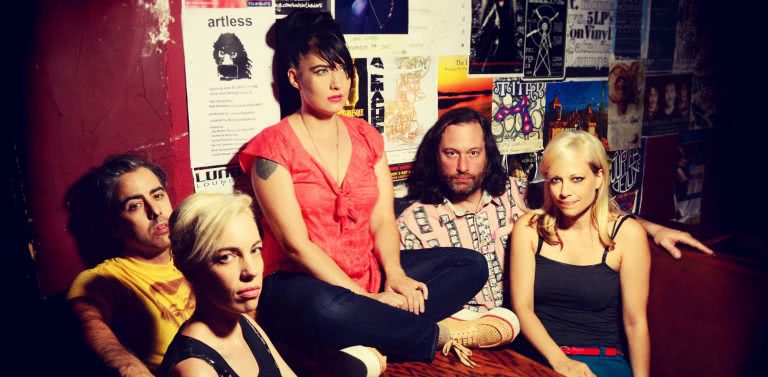It’s the radical’s perennial dilemma: is it better to agitate for change from outside of the dominant institutions of political and economic power, or can change be affected by manipulating the levers of power from within those governing structures?
Tom Hayden evolved from radical ’60s activist to typical Californian senator; in the late ’70s, The Clash’s left-wing credibility suffered a torpedo blow when the band signed with the multinational CBS.
Kathleen Hanna has spent her life challenging the dominant discursive structures of power, both in the music industry and generally. As lead singer of Bikini Kill, and a protagonist in the late ’80s and early ’90s riot grrrl punk scene, Hanna’s confronting public and lyrical statements on issues of sexuality, violence and gender politics provided inspiration for musicians – especially female musicians – across the world, and a talisman for the contemporary punk movement.
“I think it’s definitely possible for pop music to bring up interesting conversations,” Hanna says, when I ask her if it’s necessary to remain outside the dominant political institutions in order to be heard. “Most things you see in the mainstream were originally created in the underground – but that’s OK, because people in the underground have unlimited creativity. So you’ll still have these great ideas being ripped off, over and over.”
Hanna cut her political teeth in the ’80s, in the Washington State capital Olympia. Olympia was home to Evergreen State College, where Hanna had moved to study photography. There she teamed up with fellow student Tobi Vail, Kathi Wilcox and Billy Karren in Bikini Kill. “I remember [US government] policies being passed around that time that were putting girls who’d been raped in their homes back in their homes to try to keep the family together,” Hanna says. “And you had the war on drugs – totally insane things like that, that unfairly targeted minorities. We were at a boiling point – we were being told that feminism didn’t exist, we were seeing racism all around us.”
Hanna and her contemporaries turned to the punk scene and found it compromised by the same reactionary values that permeated the mainstream community.
“So we thought, ‘What’s the alternative to the alternative?’ There were definitely a lot of good things that happened in the ’80s and ’90s – Rock Against Racism, and a lot of good bands – but there was this overriding straight-white-male type of mentality. And I think we were reacting against that and looking at older punks in the ’70s and early ’80s and realising there was all this female involvement back then that got erased – Poly Styrene, Alice Bag, The Raincoats and The Slits. We thought, ‘Hey, this is what punk is all about!’”
Bikini Kill eventually folded in 1997, not long after releasing the band’s final album, Reject All American. As the group began to fall apart around her, Hanna conceived of a solo project that continued the punk ethos of Bikini Kill, but would enable her to stretch into more electronic music territory.
“I don’t really know where the ‘Julie Ruin’ name came from, though I’ve always liked the name Julie,” Hanna says. “I felt that I’d been vilified in the punk scene – I’d got a lot of attention for riot grrrl, and that had kind of pulled me out of my community, which was really painful. So I made up this person called Julie Ruin who was a lot stronger than me and who didn’t give a shit, and who just wanted to make music.”
Last year’s The Punk Singer documentary described Hanna’s battle with Lyme disease, the serious illness that precipitated her withdrawal from the music scene. Now having received stabilising treatment for the disease, Hanna has revived the Julie Ruin concept, and with it, provided herself with the strength to return to music and to continue to explore her punk philosophy.
“I’ve always considered punk an idea and not a genre. I feel a big part of that idea is that people don’t take their entertainment from corporations. People can take it upon themselves to create their own music, and their own communities, and to use music and art to connect with each other.”
The Julie Ruin play the Factory Theatre on Friday January 17. Support from Early Woman and DJ Sveta.


































